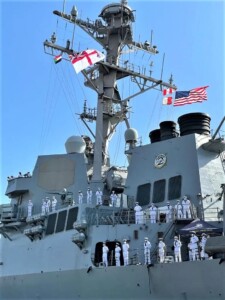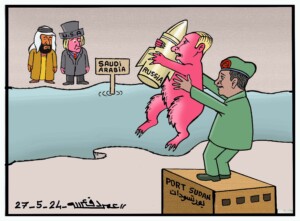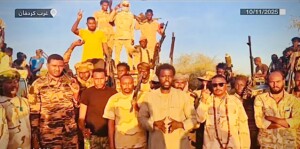Tensions between military and civilians in Sudan govt worsen as security is removed
The crisis between the military and civilian components of the Sudanese transitional government worsened in an unprecedented manner on Sunday as security forces charged with the protection of recovered assets and the office building of the Empowerment Removal Committee were instructed to abandon their posts, leaving the office and assets vulnerable.
 Mohamed Hamdan 'Hemeti' Dagalo - Deputy Chairman of the Transitional Sovereignty Council and Commander of the Rapid Support Forces (RD)
Mohamed Hamdan 'Hemeti' Dagalo - Deputy Chairman of the Transitional Sovereignty Council and Commander of the Rapid Support Forces (RD)
The crisis between the military and civilian components of the Sudanese transitional government worsened in an unprecedented manner on Sunday as security forces charged with the protection of recovered assets and the office building of the Empowerment Removal Committee were instructed to abandon their posts, leaving the office and assets vulnerable.
The Empowerment Removal Committee* explained in a press statement yesterday that the joint forces guarding the recovered real estate assets and other assets had apparently been instructed to withdraw from their posts immediately.
The committee described the step as “strange” and called on all revolutionaries to immediately go to the committee’s office in Khartoum in order to agree on how to secure the buildings, including the committee’s office.
In response, hundreds of activists flocked to the committee's office and declared their readiness to fill the security vacuum, while sources reported that police forces returned to guard the sites again late on Sunday evening.
The Committee held a press conference at its office yesterday evening amid loud cheers of the activists. Addressing those present at the conference, member of the Transitional Sovereignty Council (TSC) and the current head of the Committee Mohamed El Faki said: “I was sure that the people would act when I called to act to protect the transition”.
'We will defend the government and we will fill the streets in the event of a threat to the democratic transition' – Mohamed El Faki
He explained that he was not afraid when the guards were withdrawn because he was guarded by “the comradely spirit”. He said: "We will defend the government and we will fill the streets in the event of a threat to the democratic transition. Nobody will frighten us, and we will not allow anyone to relapse or dictate. The access to elections will be guarded by these crowds."
He said that the committee’s office building would turn into a centre of confrontation and resistance if necessary. He referred to a planned meeting with leaders of the resistance committees for reflection today.
Military orders
During the press conference Salah Mannaa, a leading member of the Empowerment Elimination Committee, reported that the forces were withdrawn from 22 locations by order of the General Staff of the Sudan Armed Forces (SAF), of which TSC Chairman Lt Gen Abdelfattah El Burhan is the Commander-in-Chief.
Mannaa further noted that the members of the military component in the TSC did not respond to the committee’s messages. “We requested the governor of Khartoum to dispatch forces as he is also the head of the Khartoum state Security Committee, but he indicated that there was already an order to withdraw the police forces from each site,” Mannaa said.
He said that Prime Minister Abdallah Hamdok expressed his surprise at the withdrawal of the joint forces and the police and explained that the police returned to the sites after the Prime Minister called. “The sites have now been secured and the police are doing their work.”
Minister of Cabinet Affairs Khaled Omar said that the withdrawal of the guards is part of a series of developments aimed at undermining the transitional period. During the joint press conference, he praised the revolutionaries' willingness to protect the committee’s office.
He said that the people do not have any problem with the SAF and stressed that they also want to remove the remnants of the Al Bashir regime and a unified army.
Omar stressed that the transitional period will end with democratic elections, that the Constitutional Document will be implemented as it is, and that no party can overthrow it.
Tensions
Media sources reported that the military component of the Sovereignty Council suspended all meetings with the civilian component. A crisis committee was reportedly established at the Council of Ministers, which held continuous meetings chaired by PM Hamdok.
The sources also reported that El Burhan held a meeting with army officers and observed the withdrawal of military guards from a number of civilian members of the Sovereignty Council, leaving them unprotected.

SAF reaction
In a speech yesterday, the fourth of its kind after the coup attempt on Tuesday, El Burhan repeated that “the armed forces are the guardians of the people and the homeland”.
'The armed forces will not turn against the December revolution' – Abdelfattah El Burhan
During the opening ceremony of a department at the Sudanese Cardiac Centre in Khartoum, he said: “We will not allow the country to be led by small forces that hijacked the revolution”. He added that “the Sudanese soldier does not defend a party or group and does not earn in dollars coming from other parties” and that “the armed forces will not turn against the December revolution”.
El Burhan promised to reveal the affiliations of the perpetrators of the coup attempt and said that the SAF “will work to reform and restructure the Sudanese military institution, while not allowing any partisan activity within the army."
"We will clean the armed forces and will not leave any affiliate of Al Bashir in it," he stated. El Burhan further stressed the determination of the armed forces to complete the democratic transition and hold the elections on time. He also confirmed that the armed forces will return to their barracks after the elections.
A different tone from the RSF
Deputy Chairman the TSC and Commander of the Rapid Support Forces (RSF) Lt Gen Mohamed Hamdan ‘Hemeti’ Dagalo presented a more confrontational tone and said that “there is no force that can isolate me from my forces […] Any threat coming from the streets will be met by streets that supports us.”
'The armed forces are not responsible for the insecurity' – Mohamed Hamdam 'Hemeti' Dagalo
During a speech at a funeral in Khartoum Saturday evening, Hemeti said that “the international community cannot threaten us”. “It was civilians [revolutionaries] that blocked the streets, not the military, so the armed forces are not responsible for the insecurity”.
He further stressed that “native administration leaders and political forces cannot be removed under the pretext that they belong to the former regime”.
Coup attempt
Tensions between the military and civilian components of the transitional government have been at an all-time high since the failed coup attempt last week. After the coup, El Burhan and Hemeti blamed the political forces for the crisis in the country. In response, government officials accused the military of stealing the revolution.
After the statements of the military leaders, Taha Osman Ishag, member of the Anti-Corruption Committee for the Sudanese Professionals Association, said that the statements of El Burhan and Hemeti “are more dangerous than the coup itself”.
* The full name of the committee is the Committee for Dismantling the June 30 1989 Regime, Removal of Empowerment and Corruption, and Recovering Public Funds. It was established by the government of Abdallah Hamdok at the end of 2019 with the aim to purge Sudan of the remnants of the Al Bashir regime. Empowerment (tamkin) is the term with which the ousted government of Omar Al Bashir supported its affiliates by granting them far-going privileges, including government functions, the setting-up of various companies, and tax exemptions.











 and then
and then